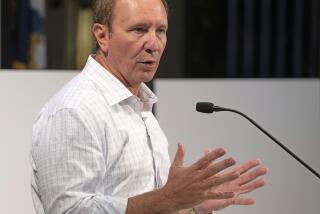Louisiana’s Roemer: Reform Stalls in Shadow of ‘Kingfish’
- Share via
BATON ROUGE, La. — Buddy Roemer talked mighty big when he was running for governor.
He talked about cleaning up state government. About ending the corruption and the palm-greasings and the good ol’ boy system of running Louisiana.
He promised to do away with all the crooked, double-dealing ways that have come to characterize Louisiana politics and in some quarters have given this state the reputation of a banana republic that somehow managed to be included in the United States.
Roemer, then an intense 44-year-old congressman representing the northwest corner of the state, did get himself elected governor 15 months ago, defeating a fellow Democrat, the high-rolling Edwin W. Edwards.
Then, as the saying goes, Buddy Roemer got sat on hard.
“It feels like it’s been 15 years,” Roemer said.
Voters Resist Taxes
He set out to reshape the state’s woeful finances with a fiscal reform package, which was submitted to voters last April. It would have raised millions of dollars in new revenues--but at the cost of a steep increase in tax bills, and that proved to be too much for an electorate decidedly unaccustomed to paying full price for state services.
The fiscal package was sharply defeated, and a grim Roemer had to face the fact that the legacy of the Kingfish lingers on.
That was Huey P. Long, the populist’s populist, the Louisiana governor who more than half a century ago set a course intended, as he put it, “to make every man a king.”
Old Huey. Everyone in Louisiana calls him by his first name, even now. He built a machine of patronage and largess on the wide back of big businesses willing to pay handsomely for the privilege of pumping Louisiana’s oil and natural gas from the earth.
He built roads and bridges and charity hospitals and created jobs by the thousands before he was assassinated in 1935 in a hallway of the Capitol--which, incidentally, he also built and next to which he is buried.
Supported by Oil, Gas
By all accounts, Long’s successors ruled the state as corrupt but benevolent kings in the succeeding decades. The message they imparted was that Louisiana would take care of its people with the oil money. All it would cost was their votes.
“The unintended consequence of that was that people divorced themselves from the cost of government. They didn’t pay for it,” Roemer said. “The Huey Long legacy is a difficult one for me to deal with because it is so powerful. It’s overwhelming.”
Now, a lengthy and crippling malaise in the oil and gas industry means the party is over. The state’s coffers are nearly empty, and it appears they will remain that way for the immediate future.
Louisiana has only a meager income tax, which has not been raised since the 1930s. There is a minimal property tax, but it is applied only to homes worth more than $75,000, and only a small percentage of houses in the state have that kind of value. Automobile license plate fees are limited by the state Constitution to $3 a pair.
In fact, the only way the state is managing to limp along for another year is by extending temporary taxes on food, medicine and utilities, which before last year were tax exempt.
Highest Jobless Rate
And there are other dispiriting statistics. Louisiana’s unemployment rate leads the nation and is double the national average. And it probably would be higher if 200,000 people hadn’t packed up and left in the last six years.
The state also leads the nation in illiteracy and number of high school dropouts. Roads and bridges are in disrepair. The predominantly segregated system of higher education is in turmoil. The once teeming swamps are slowly being polluted and destroyed.
And the state, long dependent on taxing business for its income, is finding it very difficult to attract new industry. At one point recently, Louisiana’s credit rating was just above that of junk bonds.
Into this maze of trouble marched Roemer last year, after he defeated Edwards. As the governor’s troubles have mounted, the sharks have begun to circle.
“There are a lot of people waiting to see him fail,” said state Rep. Joseph Accardo Jr., a Roemer ally who is regarded as one of the more respected players in Louisiana politics.
Roemer, dressed in a yellow polo shirt, was sitting at his desk the day after a second special session of the Legislature had come to an end last week. The session had been largely unremarkable (“Calling this a special session is a misnomer,” one state representative said) and had accomplished little.
The Harvard-educated governor, a diminutive man who somehow looked too small for such a large office, fingered a pack of cigarettes but did not light one. He had been writing a note to one of his floor leaders, trying to explain why he had vetoed a bill that would have expanded corporate liability in environmental damage cases. Roemer reasoned that the bill would be “a real deterrent to business.”
That did not mollify the bill’s author, Democratic state Rep. Bruce Bolin. “Is it any wonder this governor is losing support every day?” he asked after learning of the veto.
Inherited Situation
The governor, who would soon be departing for a short vacation, said that part of his problem stemmed from “the devastating economic landscape that I walked into in March of 1988. Let me give you two numbers: The unemployment rate was 12.2% the day I took office, the highest in America. And the net cash balance of the state Treasury was minus $540 million. We were broke. If we had been a company, we would have been bankrupt.”
But Roemer is quick to lay part of the blame on himself. He has been unable to deal successfully with other Louisiana politicians, who expect some favors from the governor in exchange for their support. Roemer is realistic enough to know that he is going to have to become politically more savvy to get any significant legislation passed.
“I’m not a typical Louisiana politician,” Roemer said. “I’m not a good ol’ boy, log-rolling, let’s-make-a-deal (kind of person) . . . . I’ve got to work on my style, to see if I can hold my principles and deal with Louisiana politicians. I would say that’s an open question.”
There are those who take issue with Roemer’s principles. State Rep. Raymond Jetson recently attacked the governor as being a model of inconsistency--saying one thing one day and exactly the opposite the next. Jetson cited Roemer’s opposition to raising the state sales tax when he was running for governor, followed by his endorsement of a sales tax increase after he took office.
Misunderstandings Cited
Bill Lynch, the state inspector general, said much the same thing.
“His biggest problem is communicating with the Legislature,” said Lynch, a Roemer appointee. “He says different things to different groups. I don’t think he misleads or lies, but he gets accused of that.”
Roemer’s defenders say that the press of business has at times been too much for the governor, has caused him to forget conversations in which commitments were made.
“There have been times when he has misspoken,” Roemer’s chief of staff, P. J. Mills, said, “but I don’t think they were lies.”
Roemer admits that he was weakened in his first year in office by a weak staff--dominated by high-minded people who were inexperienced in the ways of Louisiana politics--and by a personal impatience that in the end did more harm than good.
He blames himself for filling the legislative plate too full and then being unable to act on all the measures he wanted to accomplish.
“Perhaps I pushed the envelope a little too hard,” Roemer said. “One thing, if I had it to do over again, would be not to throw deep on the first series of downs, but to take a field goal and call it a victory, then wait for the ball to come back.”
Sees Early Mistakes
Instead, Roemer went for the big package without really consulting the veteran politicians, and he got eaten up.
“What that did was confirm all the worst fears of the political Establishment,” he said. “Rather than build beachheads, I had a plan and I tried to implement it. I went for it all.”
Roemer says now that he will no longer be charging ahead at full speed. Instead, he said, he will be working on smaller projects that eat away at the edges of Louisiana’s economic misfortune, the Huey Long legacy.
“I’m going to do some less ambitious things to show proof that the state ought to risk the ambitious plan. They’re not ready to risk it yet,” he said. “I’m going to do something I don’t do well. I going to build from the bottom up.”
Whether he has time to do that is the great unknown of Louisiana politics. Roemer pointed to other Southern reform politicians, most notably Republican Lamar Alexander of Tennessee, as people who succeeded during a second term of office after a difficult start.
“Will I have that long?” Roemer asked. “I don’t know.”
More to Read
Sign up for Essential California
The most important California stories and recommendations in your inbox every morning.
You may occasionally receive promotional content from the Los Angeles Times.













